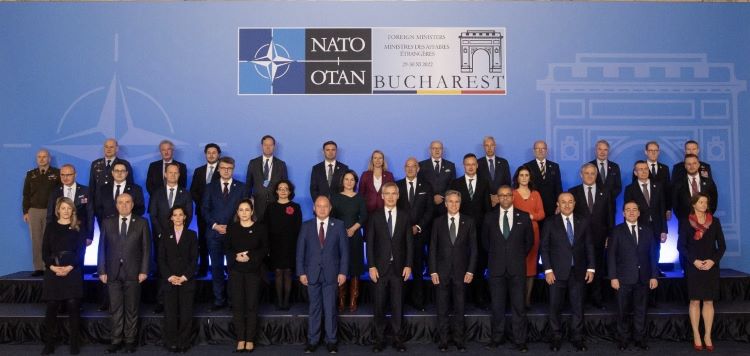The Diplomat
Foreign Minister Jose Manuel Albares took part yesterday in Bucharest in the first day of the NATO Ministerial Meeting, where the allies reaffirmed their “commitment to Ukraine’s independence, sovereignty and territorial integrity” and denounced “Russia’s cruelty against the civilian population” and Moscow’s “unacceptable actions,” “including hybrid activities, energy blackmail and reckless nuclear rhetoric.”
“From here we have to emerge the strongest and most united allies to deal with the various crises, be it energy, be it food security or be it humanitarian, that may occur” in Ukraine and the rest of the world as a result of the war, Albares told reporters upon his arrival at the meeting.
In the margins of the meeting, the minister held a bilateral meeting with his Ukrainian counterpart, Dmytro Kuleba, to whom he conveyed “the Spanish message of solidarity” in these moments in which “Russia wants to turn winter into a new weapon and wants to confront the civilian population with more unnecessary suffering”. “We have to support Ukraine also from a humanitarian point of view, and in that we will spare no effort, neither to favor the unity of the allies in this context, nor to give a response to the humanitarian, energy and security situation,” he added in his statements to the press.
During the bilateral meeting, Albares was decorated by Kuleba with the Yaroslav the Wise medal, the highest award of the Kyiv government to personalities who have performed outstanding service to the state and the population of Ukraine, for “their support and defense of Ukraine and also of Europe”.
At the end of the first day, the foreign ministers signed a Joint Declaration in which they welcomed Kuleba, expressed their “full solidarity” with “the Government and people of Ukraine in their heroic defense of their nation and land” and remained “steadfast” in their “commitment to the independence, sovereignty and territorial integrity of Ukraine,” which includes non-recognition of “Russia’s illegal annexations, which flagrantly violate the UN Charter.”
The ministers also pledge to continue and intensify “political and practical support to Ukraine” for as long as “necessary,” as well as to help Ukraine “strengthen its resilience” and support Ukraine’s efforts to repair its energy infrastructure, to protect “its population from missile attacks” and to embark on “its path of post-war reconstruction and reforms.” “We will continue to strengthen our partnership with Ukraine as it moves forward with its Euro-Atlantic aspirations,” reads the Declaration.
The ministers also denounce “Russia’s unacceptable actions, including hybrid activities, energy blackmail and reckless nuclear rhetoric,” which “undermine the rules-based international order,” and condemn “Russia’s cruelty against Ukraine’s civilian population and human rights violations and abuses.”
For his part, NATO Secretary General Jens Stoltenberg said at the press conference closing the first day that the Bucharest meeting had sent “a strong message of NATO unity, and of sustained support for Ukraine” and denounced President Vladimir Putin’s attempts to “militarize” the winter to “force Ukrainians to freeze or flee and to divide all of us who support them.” Regarding Ukraine, the secretary general assured that NATO “recognizes and respects” its “membership aspirations,” but warned that the Alliance “is now focused on providing immediate support as Ukraine defends itself against Russian aggression.”







